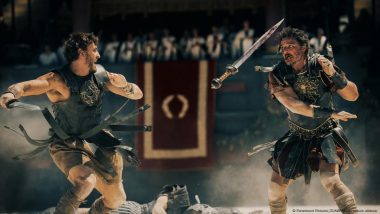The blockbuster sequel "Gladiator II" is one of the most anticipated releases of the year. How does the ancient Roman gladiatorial tradition compare to today's reality shows?"Gladiator," a blockbuster from the year 2000, was a monumental epic that received numerous awards and nominations. Now, 24 years later, the sequel finally hits cinemas worldwide.
Also Read | Sports News | Kumamoto Masters Japan: PV Sindhu Advances to Second Round After Beating Thailand’s Busanan.
Certainly a big draw for fans is the fact that "Gladiator II" was also directed by Ridley Scott. The now 86-year-old British filmmaker was responsible for cult films including "Alien" (1979), "Blade Runner" (1982) and most recently "Napoleon" (2023).
Also Read | World News | Trump Makes Victor’s Return to Washington to Meet with Biden and GOP Lawmakers.
But beyond that, gladiators' battles remain a topic of endless fascination. And if you take a closer look, you might find some parallels to the success of today's TV reality shows.
People need 'bread and circuses'
This quote, attributed to the Roman poet Juvenal, refers to how the population can usually be kept appeased as long as they are provided food and entertainment. Juvenal was actually criticizing the Roman people for not taking enough interest in politics and allowing themselves to be manipulated through superficial distractions.
Indeed, the fight of the gladiators was the "greatest political tool of its time," says historian and gladiator expert Alexander Mariotti, who lives in Rome near the Colosseum.
The emperor who commissioned the Colosseum, Vespasian, took power in difficult times: Rome had just come off civil war and was in turmoil. "Vespasian was a man of the people and he understood he needed a way to get people to love him, because the emperorship was basically in trouble," Mariotti tells DW. "The Romans actually used to dole out grain, so that's the 'bread' covered. And of course, their 'circuses' were these elaborate, expensive live games."
Reality TV — the modern 'circuses'?
Olivia Stowell, a PhD candidate at the University of Michigan whose research focuses on the history of reality TV, also sees a link between gladiatorial fights and shows such as "Survivor." In both formats, people are competing for the viewing pleasure of the audience.
She adds humorously that even though "Candid Camera," a long-running comedy show that premiered in 1948, is often identified as the first reality TV program, "I should expand my prehistory of reality TV... I should start with the Colosseum!"
One might argue at this point that the participants in a TV show typically sign up voluntarily, while gladiators in ancient Rome did not. But that's not quite true. Early on, most gladiators were slaves, or criminals sentenced to do their time in the arena. But as these games grew in popularity, more people began to willingly sign up for "gladiator schools," which trained them to become professionals — real heroes who embodied Roman virtues like courage and strength.
"We know that by 75 BC half of all gladiators are free people, they're free men. And they were very handsomely paid: You would get 2000 sestersi as a signing up bonus. Just to put that in perspective, 900 sestersi is the annual salary for a Roman soldier. So you're getting two years' worth of pay of a soldier in one signing up," explains Mariotti. It was kind of an easy way to make a lot of money. And one has to remember, the Roman historian adds, "that in antiquity it was a lot harder to change your social status than today."
A lottery for fame and fortune
Gladiators knew that they were risking death. But there was also a chance to become rich and famous. "You were the most sexually desired athlete of your time," says Mariotti. "They were regarded as the lowest of society, but they were also admired greatly."
Contestants in reality TV shows normally don't risk death, but they also sacrifice something in return, hoping for fame and fortune, says Olivia Stowell. "Privacy is a big one. And also dignity to a degree." A classic method of creating drama, for example, is to deprive people of sleep and to provide a lot of alcohol, "those kinds of things, which creates the condition where you have these sleep-deprived people who are sometimes inebriated, who are also really cut off from their life support systems." Famous examples include "The Bachelor," "Survivor" and "Big Brother. "
Reality contestants often talk about "the outside world," because for the time of the show they live in a separate world where they leave their family, friends, jobs, comforts and routine behind — another parallel to the gladiators, who were also completely cut off from the rest of society.
Producers — the modern emperors?
Comparing the gladiators with the contestants of a modern reality show raises the question: Who is the emperor in the modern day analogy? "I think, it is us — the show maker," says Sagar More, a producer and director from Mumbai, India — a country that has gone mad for reality TV in recent years.
More has directed 10 seasons of India's longest-running reality show, "Roadies."
He would never want to be a contestant, he admits very honestly. "No way: I know what I make them go through!"
"Roadies" follows young people on the road for 30 days, as they travel around different parts of the country and fulfill tasks and challenges. "We just create situations and people fill in their emotions and their strategies into it. But as the seasons have grown, the tasks have become bigger and bigger. So things have become more intense," he explains.
More also points out that there are hours and hours of footage. Editors have to choose what to include and, importantly, what to leave out. That's a lot of power in their hands. "It can actually change the course of a story," he says. The most important criteria in the decision process: the entertainment factor for the audience.
Winning the public's favor
Back in ancient Rome, the emperor had direct power over the fate of the gladiator. But he also had the spectators in mind, ultimately aiming to maintain his popularity. When one of the gladiators lost their weapon and lifted a finger — the symbol to ask for mercy — the emperor would normally ask the crowd to signal by gestures or shouts if the gladiator should be pardoned or put to death.
In our times, reality TV is obviously not about death, but it has fielded a lot of criticism over the years, be it for bad working conditions on set, for promoting unhealthy beauty standards or for being fake and manipulative.
One thing that has particularly stepped into focus recently is mental health. Contestants on many different shows have spoken out about the loneliness, anxiety and even depression they experienced during and after filming. Many shows now offer some form of psychological support during and even after filming, but it's not always enough.
Gladiator fights were banned at the beginning of the 5th century, but today, films about them still attract many people. Ridley Scott's first "Gladiator" grossed around $457 million (€419 million) worldwide. And the sequel is also expected to earn a similar thumbs-up.
This article is an adaptation of an episode of the podcast "Don't Drink the Milk: The curious history of things" by Charli Shield and Rachel Stewart, edited by Sam Baker.
Article edited by: Elizabeth Grenier
(The above story first appeared on LatestLY on Nov 13, 2024 08:10 PM IST. For more news and updates on politics, world, sports, entertainment and lifestyle, log on to our website latestly.com).













 Quickly
Quickly





















